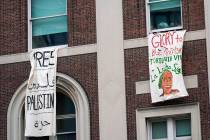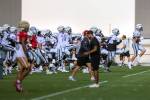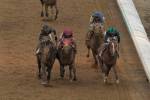The obesity cure: free-range kids
Last week, I offered a different take on why so many kids are getting fat.
For once, it appears we can all agree on something: Today's youngsters don't get outside enough. That's a no-brainer.
But I have yet to hear anyone -- from first lady Michelle Obama, who's made reducing childhood obesity her personal crusade, to the advocacy groups that shake down the fast-food industry -- seriously address why kids don't get outside. And I can't see American kids slimming down until we do.
My conclusion: Children don't get outside because our current parenting culture prohibits unsupervised outdoor play. Today's kids don't have anywhere near the freedom that previous generations enjoyed.
Instead of exploring our neighborhoods and rounding up friends for outdoor play -- and getting a great workout in the process -- our kids are contained until parents or other adults can plan activities and accompany them outside. Which, in the age of stressed, working parents, is infrequent at best.
I shared a few of my experiences growing up in the 1970s and '80s, and I invited readers to share theirs. It turns out I'm not alone in thinking that today's kids would benefit greatly from old-school parenting standards.
Lova Reynolds of Henderson writes:
"Your article prompted a visceral, intense response in me. I had an idyllic childhood growing up. My parents were very strict in many ways, but I was allowed the freedom to explore, both friendships and locations.
"I nearly wore out a bicycle and a faithful dog exploring the woods, fields and roads for miles. I was often accompanied by one or more neighborhood kids who had the same liberties. The only punishable offense in my adventures was coming home late (past 5:30 p.m.).
"My own three boys were given many of the same freedoms to explore both the rural countryside and the bus routes in and around our home in Saratoga, Calif. That environment was similar to Green Valley today. They also participated in sports. They all survived, too, and are happy, thin, well-adjusted, adults.
"I really do feel sorry for the children of parents who have been terrified by the over-reporting and near hysteria about abductions, accidents and injuries. Not only are we going to be raising overweight kids, we're also likely to be raising timid and tenuous ones."
Susan Gill of Greenvale, N.Y., writes:
"In my girlhood days in the late '50s and early '60s, we played outside during after-lunch recess at school, walked back and forth to school, and when we came home, played outdoors until supper time. We roller skated, rode bikes and generally played games that entailed running around.
"Now my mother was a worrier, even in those halcyon days, so I was not allowed to ride my bike too far off the block and I had to tell her where I was going. But even with that restriction, we played outside, in the road (not that many cars) or in each other's back yards.
"I think one of the key factors in the difference in kids' play time is that in my day, mothers were always home. Neighborhoods were alive with people who lived in homes, not merely residing in them as a place to sleep and watch TV. My mother, as did most of the mothers on my street, hung clothes out on a clothesline, they gardened and visited with neighbors, so there were always watchful eyes around.
"Today, neighborhoods are like dead things. No one is home."
Kevin J. Brobeck of Las Vegas and I are separated by a few generations, and we grew up on opposite ends of the country, but our childhoods have at least two things in common: neighborhood buddies whose names we'll never forget, and epic games of Wiffle Ball (with no parents around).
"We all walked (ran) to school each day," Kevin writes of his upbringing in the paper mill town of West Fitchburg, Mass. "During morning and afternoon recess we all ran around like freed ostriches. After school, we all ran home to play some more before supper.
"The sole children's warning back then was 'Don't talk to strangers.' We never did. There weren't any."
Las Vegas residents Tobbe Dee and Barbara R. Mazur e-mailed separately to share stories of their childhoods in southside Chicago. Both grew up playing outside under one, neighborhood-wide rule: be in front of your own house when the streetlights came on.
"During the summer, after dinner was over, all the kids on the block would be outside playing in the street, riding bikes, roller-skating on the sidewalks, playing hide and seek, hopscotch and rollie pollie, to name but a few activities," Barbara writes.
"No kid that I knew of sat in front of the tube for hours on end. That was considered boring, because all the action was outside."
Kathleen Miller of Las Vegas offers:
"I was vigorously nodding my head while reading your column from Sunday's paper.
"I grew up in a small town in the Midwest where spending the whole day outside riding bicycles or playing kickball was a staple of summer.
"My husband grew up here in the valley. His folks moved to Henderson in 1955, and he describes a similar experience in childhood, bike riding, playing out in the desert, kick ball, baseball.
"My grandchildren rarely get to play outside, at the ages of 10 and 3. Only when there is adult supervision are they allowed outside.
"But in addition to the kids not spending much time outside, my kids know very few of their neighbors, as they are always working or inside watching TV or on the computer."
Among the common denominators here: No one needed more government programs or higher taxes to lead active lives.
Next week: The reasons school playgrounds are closed to children dying to play on them, what we can do to open them, and other reader thoughts on how to get kids outside.
Glenn Cook (gcook@reviewjournal.com) is a Review-Journal editorial writer.























